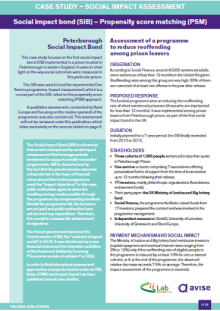Evaluation of the first Social Impact Bond (SIB)
Assessment of a programme to reduce reoffending among prison leavers
This case study focuses on the first social impact bond (SIB) implemented in a prison located in Peterborough in eastern England. It seeks to shed light on the way social outcomes were measured in this particular prison. This SIB was used to fund the experimental One Service programme. Impact measurement, which is a crucial part of the SIB, relied on the propensity score matching (PSM) approach.
The Social Impact Bond (SIB) is a financial instrument underpinned by social impact measurement that leverages private investment to support socially-innovative programmes. SIB is characterized by the fact that the private investor assumes a financial risk in the hope of financial return should the funded programme meet the “impact objectives”. In this case, public authorities agree to share the resulting savings made possible through the programme by compensating investors. Should the programme fail, the investors are not paid and public authorities have not incurred any expenditure. Therefore, it is crucial to measure the achievement of objectives.
The French government launched the French version of SIB, the “contract à impact social”, in 2016. It was introduced as a new financial instrument for innovative activities of the Social and Solidarity Economy (“Économie sociale et solidaire” or ESS).
In order to illustrate various assessment approaches of projects funded under an Social impact bonds, l'Avise, KPMG and the Impact invest lab, publish this case study which contributes to the Avise's resource center dedicated to social impact.
